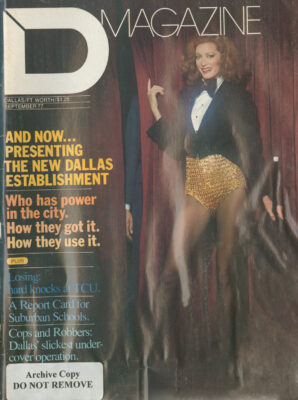What is power?
I’d asked the question two or three times already during the story conference, but the discussion had slid by me to other subjects. Now I ask again.
Silence. Five people sit around the table, variously doodling on legal pads or staring out of the window or shifting in their chairs.
We’re about to devote x number of pages in this magazine to new power in Dallas, and nobody can even explain what power is.
An editor leans forward and folds his arms on the table. “I’ve got an idea.”
Go ahead.
“Power means never having to say you’re sorry.”
We’re in trouble.
Of course, when you get down to the rock bottom of things, he’s right. When Mao Tse-tung said that all power comes from the barrel of a gun, he was merely simplifying the classic definition: in an ordered society power rests with those who have the legitimate authority to use force when the occasion demands. Assume the City of Dallas were to invoke the right of eminent domain in order to demolish your house. Assume you resented the loss of your house, and decided to squat on your front porch to keep the bulldozers from carrying it off. After peaceful negotiations broke down, the issue would be settled with the arrival of the police. The city has power.
Who else? The next rung is occupied by those who are able to affect peoples’ lives for good and for ill as incentive to get those people to do what they want, often involuntarily. The old ward machines in the North had that power, and on occasion the old Dallas oligarchy could show the same kind of muscle. Say you oppose, as a matter of principle, a plan by the city fathers to tear down a public housing project to build a new highway. They want the project torn down quickly and quietly. Any vocal opposition inside the city might raise eyebrows in Washington and cause a delay in federal funds from cautious bureaucrats. One day your boss gets a call. The next day you’re called into his office. Suddenly no opposition.
That kind of power is efficient, but it’s also capricious and unpopular, and therefore practically obsolete – except in most small Texas towns. In a city composed of different constituencies ready to wrangle over any given public topic at the drop of a hat, the old way is not only crude, but probably dangerous.
So power is open, exercised in public. It is a matter of counting votes. But when it comes to counting votes, there are some who can count higher than others.
Those who can deliver the votes – or withhold them – have power. It isn’t true power, because it isn’t direct. The person who gets somebody elected to office can’t exercise the prerogatives of that office himself. But it isn’t mere influence, either, because it can occasionally be delivered with a punch. You’ll recall when the county commissioners recently voted to build the new jail downtown. It was their decision, properly made, within the bounds of their authority. Seven days later they changed their minds. In the intervening week the business community had counted its votes and delivered its verdict: if you build downtown, we’ll massacre you. When you’re a politician, it makes you think.
Which says something about politicians and power in this city: their power derives from who they are, not the office they hold. The President is powerful, no matter who he happens to be. The Governor of Texas, with very limited constitutional powers, is strong nevertheless, even when he’s Dolph Briscoe. But compare the mayoralty of Wes Wise with that of Bob Folsom. Or the county judge-ship of John Whittington with that of Lew Sterrett. Politicians, as politicians, still have a long way to go around here.
One other form of power shouldn’t be forgotten: the power to disrupt. Dallas Legal Services and liberal activist Dan Weiser have honed to a fine tool their right of redress in federal court; they’ve made their petitions as important as any election. They’ve done it with the objective of power in mind: to take it from others and bestow it on themselves. It’s a new and very effective tactic: It’s much easier to campaign before three appeals judges than before the voters.
Our survey shows more than anything else that definitions of power are forged in the working. In interviews for the cover story, one phrase came up again and again when someone wanted to be very complimentary about someone else: “He’s got the ability to get things done.” Power, it seems, can be created out of thin air by those with the will and energy. The men and women we write about get things done; otherwise, we wouldn’t have much to report. While that may make our definitions of power elusive, it does make the ways of power interesting indeed.
Related Articles

D CEO Award Programs
Winners Announced: D CEO’s Financial Executive Awards 2024
Honorees in this year’s program include leaders from o9 Solutions, Baylor Scott & White, and Texas Capital, as well as our Constantine ‘Connie’ Konstans Award winner Mahesh Shetty of ILE Homes.

Basketball
What We Saw, What It Felt Like: Mavs-Clippers Game 2
A gritty game draws Dallas even in the series.
By Iztok Franko and Mike Piellucci



